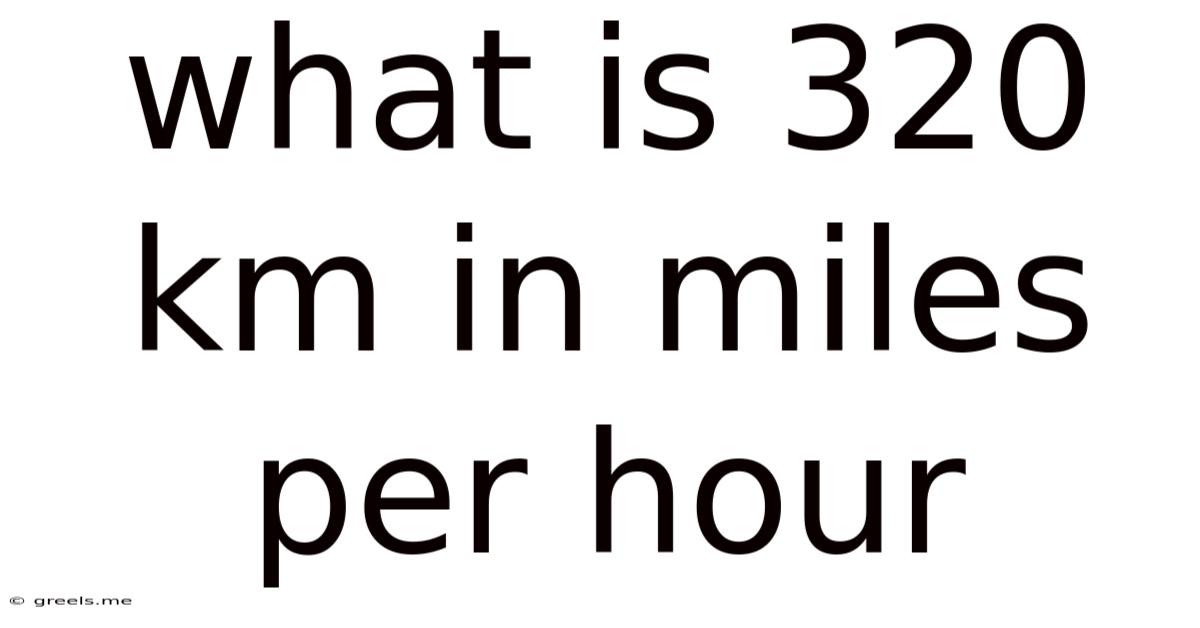What Is 320 Km In Miles Per Hour
Greels
May 23, 2025 · 4 min read

Table of Contents
Decoding the Question: What is 320 km in Miles Per Hour?
The question "What is 320 km in miles per hour?" is inherently flawed. It's mixing up units of distance (kilometers) with units of speed (miles per hour). 320 kilometers is a distance, not a speed. Miles per hour (mph) is a measure of how far something travels in one hour. To make sense of this question, we need to reframe it. We can explore what it could mean and how to correctly calculate speed involving kilometers and miles.
Understanding the Units: Kilometers and Miles
Before diving into calculations, let's establish a clear understanding of the units involved:
- Kilometers (km): A unit of length in the metric system. One kilometer is equal to 1000 meters.
- Miles (mi): A unit of length in the imperial system. One mile is approximately equal to 1.609 kilometers.
- Miles per hour (mph): A unit of speed representing the distance traveled in miles in one hour.
Possible Interpretations and Calculations
The original question could be interpreted in a few ways, each requiring a different calculation:
1. Converting a Speed from km/h to mph:
Let's assume the question intended to ask: "If something travels at 320 kilometers per hour, what is that speed in miles per hour?"
This is a straightforward unit conversion. We'll use the conversion factor 1 mile ≈ 1.609 kilometers.
-
Calculation:
320 km/h * (1 mi / 1.609 km) ≈ 198.84 mph
Therefore, a speed of 320 kilometers per hour is approximately 198.84 miles per hour.
2. Calculating Average Speed over a Distance of 320 km:
The question could also imply: "If something travels 320 kilometers in a certain amount of time, how do we calculate the average speed in miles per hour?"
In this case, we need additional information: the time taken to cover the 320 kilometers. Let's assume it took 2 hours.
-
Calculation:
Average speed in km/h = Total distance / Total time = 320 km / 2 h = 160 km/h
Now convert this speed to mph:
160 km/h * (1 mi / 1.609 km) ≈ 99.44 mph
Therefore, the average speed is approximately 99.44 miles per hour.
3. Calculating Time to Cover 320 km at a Given Speed:
Another possible interpretation: "If something travels at a speed of X mph, how long will it take to cover 320 kilometers?"
Here, we need the speed in either km/h or mph. Let's assume the speed is 80 mph. First, convert this to km/h:
-
Conversion:
80 mph * (1.609 km/mi) ≈ 128.72 km/h
-
Calculating Time:
Time = Distance / Speed = 320 km / 128.72 km/h ≈ 2.48 hours
This is equivalent to approximately 2 hours and 29 minutes.
Therefore, at 80 mph, it would take approximately 2.48 hours to cover 320 kilometers.
4. Exploring Different Speeds and Their mph Equivalents:
Let's analyze the mph equivalents for different speeds in km/h:
| Speed (km/h) | Speed (mph) (approx.) |
|---|---|
| 50 | 31.07 |
| 70 | 43.50 |
| 100 | 62.14 |
| 120 | 74.56 |
| 150 | 93.21 |
| 200 | 124.27 |
| 250 | 155.34 |
| 300 | 186.41 |
| 350 | 217.48 |
| 400 | 248.55 |
This table provides a quick reference for various speed conversions.
The Importance of Precision in Unit Conversions
Accuracy in unit conversions is crucial, especially in fields like transportation, navigation, and engineering. Using approximate conversion factors (like 1 mile ≈ 1.61 kilometers) is acceptable for many everyday situations, but for precise calculations, it's essential to use more accurate factors, such as the value provided earlier (1 mile = 1.609344 kilometers). Slight inaccuracies in conversions can lead to significant errors in the final results, particularly when dealing with larger distances or higher speeds.
Advanced Concepts and Real-World Applications
The simple conversions demonstrated above provide a foundation. However, real-world scenarios often involve more complex factors:
- Variable Speed: Vehicles rarely travel at a constant speed. Average speed calculations are used to represent the overall journey.
- Environmental Factors: Wind, terrain, and traffic all affect travel time and speed.
- Error Propagation: Errors in measuring distance and time will impact the accuracy of calculated speed.
Understanding how to handle these factors is important for tasks such as:
- Trip Planning: Estimating travel time based on distance and expected speed.
- Fuel Efficiency Calculations: Determining fuel consumption based on distance and speed.
- Navigation Systems: Calculating routes and estimated arrival times.
- Traffic Management: Monitoring and controlling traffic flow based on speed and density.
Conclusion
The initial question highlighted the importance of clarity and accuracy in expressing units and calculations. While "320 km" is a distance, it doesn't directly translate to "miles per hour." Through various scenarios, we've demonstrated how to correctly handle conversions and calculations involving kilometers, miles, and speed. Understanding the nuances of these units and their application in real-world situations is essential for accurate measurements and efficient problem-solving. Remember to always double-check your units and calculations to avoid errors.
Latest Posts
Related Post
Thank you for visiting our website which covers about What Is 320 Km In Miles Per Hour . We hope the information provided has been useful to you. Feel free to contact us if you have any questions or need further assistance. See you next time and don't miss to bookmark.